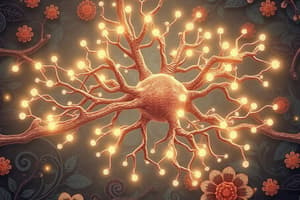Podcast
Questions and Answers
What is one functional significance of GABA?
What is one functional significance of GABA?
- Increases heart rate
- Inhibits neural activity (correct)
- Enhances muscle contraction
- Stimulates dopamine production
Which substance is commonly associated with performance enhancement in sports?
Which substance is commonly associated with performance enhancement in sports?
- Strychnine (correct)
- Acetylcholine
- Dopamine
- Serotonin
What best describes glycinergic transmission?
What best describes glycinergic transmission?
- It primarily functions in the peripheral nervous system.
- It involves the action of glycine as a neurotransmitter. (correct)
- It enhances excitatory signals in the brain.
- It is responsible for the synthesis of serotonin.
What role do agonists play concerning neurotransmitters like GABA?
What role do agonists play concerning neurotransmitters like GABA?
Which of the following statements is incorrect regarding GABA?
Which of the following statements is incorrect regarding GABA?
Which factor contributes to the inactivation of GABA in the synaptic cleft?
Which factor contributes to the inactivation of GABA in the synaptic cleft?
What is one potential agonist of glycine?
What is one potential agonist of glycine?
Which neurotransmitter's synthesis and abundance is discussed alongside GABA?
Which neurotransmitter's synthesis and abundance is discussed alongside GABA?
What role does glycine play in the embryonic nervous system?
What role does glycine play in the embryonic nervous system?
What is the significance of the K+/Cl– co-transporter KCC2 in neuronal development?
What is the significance of the K+/Cl– co-transporter KCC2 in neuronal development?
How do alcohol and anesthetics affect glycine receptors?
How do alcohol and anesthetics affect glycine receptors?
What condition is associated with glycinergic dysfunction?
What condition is associated with glycinergic dysfunction?
When do glycinergic synapses become functional during brain development?
When do glycinergic synapses become functional during brain development?
Which agents are known to modulate glycine receptors?
Which agents are known to modulate glycine receptors?
What happens to glycine's effect on neurons as KCC2 is expressed?
What happens to glycine's effect on neurons as KCC2 is expressed?
Which statement about β mRNA regarding glycine receptors is true?
Which statement about β mRNA regarding glycine receptors is true?
What compounds are known to activate glycine receptors in order of effectiveness?
What compounds are known to activate glycine receptors in order of effectiveness?
Which type of subunits in glycine receptors contains the glycine binding site?
Which type of subunits in glycine receptors contains the glycine binding site?
How are glycine receptors inhibited non-competitively?
How are glycine receptors inhibited non-competitively?
Which glycine receptor subunit is primarily expressed during early development?
Which glycine receptor subunit is primarily expressed during early development?
What is a significant characteristic of glycine receptors that contain β subunits?
What is a significant characteristic of glycine receptors that contain β subunits?
In which area of the CNS have both GABA and glycine been shown to co-release?
In which area of the CNS have both GABA and glycine been shown to co-release?
Which of the following accurately describes the structure of glycine receptors?
Which of the following accurately describes the structure of glycine receptors?
Which α subunit corresponds to strychnine-sensitive sites in adults?
Which α subunit corresponds to strychnine-sensitive sites in adults?
What role does GABA play in neuropsychiatric disorders?
What role does GABA play in neuropsychiatric disorders?
Which of the following symptoms is NOT associated with GABA transaminase deficiency in infants?
Which of the following symptoms is NOT associated with GABA transaminase deficiency in infants?
GABA is considered excitatory in which developmental stage of the nervous system?
GABA is considered excitatory in which developmental stage of the nervous system?
What is a common characteristic of GABA transaminase deficiency?
What is a common characteristic of GABA transaminase deficiency?
In what way does GABA functionality change during early neural development?
In what way does GABA functionality change during early neural development?
What is a major consequence of GABA transaminase deficiency?
What is a major consequence of GABA transaminase deficiency?
How does intracellular chloride accumulation affect immature neurons?
How does intracellular chloride accumulation affect immature neurons?
Which of the following disorders is closely linked to GABA's functions?
Which of the following disorders is closely linked to GABA's functions?
What muscle tone condition is continuously present in infants with hereditary hyperekplexia?
What muscle tone condition is continuously present in infants with hereditary hyperekplexia?
How do older individuals with hereditary hyperekplexia typically respond to startle stimuli?
How do older individuals with hereditary hyperekplexia typically respond to startle stimuli?
Which receptor is primarily associated with inhibitory neurotransmission in the brain?
Which receptor is primarily associated with inhibitory neurotransmission in the brain?
What type of neurotransmitter is GABA classified as?
What type of neurotransmitter is GABA classified as?
Which receptor is known for its role in mediating excitatory neurotransmission?
Which receptor is known for its role in mediating excitatory neurotransmission?
Among the following, which receptor type is associated with metabotropic pathways?
Among the following, which receptor type is associated with metabotropic pathways?
What is the primary function of NMDA receptors in the nervous system?
What is the primary function of NMDA receptors in the nervous system?
Which receptor is least likely to be involved in fast synaptic transmission?
Which receptor is least likely to be involved in fast synaptic transmission?
Flashcards
GABA synthesis
GABA synthesis
gamma-aminobutyric acid (GABA), a neurotransmitter found in the brain, is synthesized from glutamate. GABA is involved in reducing neuronal activity, promoting relaxation, and inhibiting anxiety.
Glycine function
Glycine function
Glycine is an amino acid that acts as a neurotransmitter in the spinal cord and brainstem. It is involved in inhibiting motor neuron activity and regulating muscle movement.
GABA receptors
GABA receptors
GABA receptors are protein complexes found on neurons that bind to GABA. They are classified into GABA-A and GABA-B receptors, each with distinct actions.
Strychnine effect
Strychnine effect
Signup and view all the flashcards
Glycine receptors
Glycine receptors
Signup and view all the flashcards
GABAergic transmission
GABAergic transmission
Signup and view all the flashcards
Glycinergic transmission
Glycinergic transmission
Signup and view all the flashcards
GABA inactivation
GABA inactivation
Signup and view all the flashcards
GABA's role in disorders
GABA's role in disorders
Signup and view all the flashcards
GABA-T deficiency
GABA-T deficiency
Signup and view all the flashcards
GABA's excitatory role in development
GABA's excitatory role in development
Signup and view all the flashcards
GABA's role as an inhibitory neurotransmitter
GABA's role as an inhibitory neurotransmitter
Signup and view all the flashcards
What is the structure of glycine receptors?
What is the structure of glycine receptors?
Signup and view all the flashcards
What are the different types of subunits found in glycine receptors?
What are the different types of subunits found in glycine receptors?
Signup and view all the flashcards
Can glycine receptors be formed with only alpha subunits?
Can glycine receptors be formed with only alpha subunits?
Signup and view all the flashcards
What molecules activate glycine receptors?
What molecules activate glycine receptors?
Signup and view all the flashcards
How can glycine receptors be inhibited?
How can glycine receptors be inhibited?
Signup and view all the flashcards
Where and when are different glycine receptor subtypes found?
Where and when are different glycine receptor subtypes found?
Signup and view all the flashcards
How does the distribution of glycine receptors change?
How does the distribution of glycine receptors change?
Signup and view all the flashcards
What is the function of glycine receptors?
What is the function of glycine receptors?
Signup and view all the flashcards
How does glycine act in the developing nervous system?
How does glycine act in the developing nervous system?
Signup and view all the flashcards
What causes the switch in glycine's role from excitatory to inhibitory?
What causes the switch in glycine's role from excitatory to inhibitory?
Signup and view all the flashcards
What substances affect glycine receptors?
What substances affect glycine receptors?
Signup and view all the flashcards
How does alcohol influence the nervous system?
How does alcohol influence the nervous system?
Signup and view all the flashcards
What is hereditary hyperekplexia?
What is hereditary hyperekplexia?
Signup and view all the flashcards
What is the role of β-mRNA in glycine receptors?
What is the role of β-mRNA in glycine receptors?
Signup and view all the flashcards
When do glycinergic synapses become functional?
When do glycinergic synapses become functional?
Signup and view all the flashcards
How do glycine and GABA act in developing neurons?
How do glycine and GABA act in developing neurons?
Signup and view all the flashcards
What is hypertonia in hyperekplexia?
What is hypertonia in hyperekplexia?
Signup and view all the flashcards
What is the startle reaction in hyperekplexia?
What is the startle reaction in hyperekplexia?
Signup and view all the flashcards
What happens during the 'rigid period' in hyperekplexia?
What happens during the 'rigid period' in hyperekplexia?
Signup and view all the flashcards
What is hypnagogic myoclonus?
What is hypnagogic myoclonus?
Signup and view all the flashcards
What is the response to a nose tap in hyperekplexia?
What is the response to a nose tap in hyperekplexia?
Signup and view all the flashcards
Can seizures occur in hyperekplexia?
Can seizures occur in hyperekplexia?
Signup and view all the flashcards
When do hyperekplexia symptoms typically fade?
When do hyperekplexia symptoms typically fade?
Signup and view all the flashcards
AMPA receptor
AMPA receptor
Signup and view all the flashcards
NMDA receptor
NMDA receptor
Signup and view all the flashcards
Study Notes
GABA & Glycine
- GABA and glycine are neurotransmitters
- GABA is the main inhibitory neurotransmitter in the adult nervous system
- Ironically, glutamic acid, a major excitatory neurotransmitter, is the precursor to GABA
- GABA is synthesized by glutamic acid decarboxylase (GAD)
- GAD (either 65 or 67) is localized on GABAergic neurons
- GABA is found in various inhibitory interneurons (ex: basket, stellate) and projection neurons (ex: Purkinje) throughout the brain
- GABA is removed from the synaptic cleft by uptake transporters on astrocytes and presynaptic terminals (GLYT1 & GLYT2)
- Removal of a carboxyl group by GAD turns glutamate into GABA
- GABA is transported back into GABAergic terminals via dedicated GABA transporters
- GABA is buffered by astrocytes where it is degraded by GABA transaminase (GABA-T)
Learning Outcomes
- Discuss the synthesis and abundance of GABA, and GABAergic transmission and inactivation of GABA action, including agonists and antagonists & functional significance
- Discuss the synthesis and abundance of glycine, and glycinergic transmission and inactivation of glycine action, including agonists and antagonists & functional significance
- Review cocculus indicus and its case in the House of Commons
- Introduce strychnine, and performance enhancement in sports
GABA Receptors
- GABA receptors are thought to be pentameric complexes, comprised of possibly more than 2000 different subunit combinations (~20 widely expressed; fewer dominant).
- The major subunit in the brain is a1, with a stoichiometry of α1β2γ2.
- Receptors containing the a2 subunit are abundant in regions where the a1 subunit is absent.
- a3 subunit is expressed in complementary regions to a1, including the lateral septum, reticular nucleus of the thalamus, and brainstem nuclei.
- a6 subunit is expressed almost exclusively in the cerebellum.
- GABA receptors are allosterically modulated by alcohols and anesthetics (e.g., enflurane and isoflurane).
- They are also affected by cocaine and a number of 5HT3 and NMDAR ligands.
Glycine
- Glycine is synthesized from serine by serine hydroxymethyltransferase (SHMT), a pyridoxal phosphate-dependent enzyme.
- Glycine packaged into vesicles by vesicular transporter (unk).
- Glycine is removed from cleft by uptake transporters on astrocytes and presynaptic terminals (GLYT1 & GLYT2).
- Both GLYT1 and GLYT2 are expressed in caudal areas of the brain, and GLYT1 is also expressed in the forebrain.
- Degradation occurs by glycine cleavage system (GCS) in mitochondria.
- Glycine receptors are believed to be pentameric (possessing some similarity to nicotinic cholinergic and 5HT3 structures).
- Glycine receptors are composed of (four) a subunits and (single type) β subunits.
- Activated by glycine, L-serine, D-serine. L-alanine. D-alanine, and by some other amino acids, but not by GABA
- Inhibited competitively by strychnine or non-competitively by picrotoxin. Receptors that contain β subunits are insensitive to picrotoxin.
Receptor Nomenclature
- GABAA receptors form chloride channels in pentameric homo or heteromeric subunit complexes
- GABAB receptors are G protein–coupled 7-TM receptors that consist of heterodimeric complexes of B1a/B2 or B1b/B2
- There is some dispute about whether GABAC receptors are distinct from the GABAA receptors.
Drugs Affecting GABAergic Transmission
- Some drugs act as agonists (ex: GABA), antagonists (ex: bicuculline), or inverse agonists
- Drugs like benzodiazepines, barbiturates, and steroids can affect the GABAA receptor
- Drugs like baclofen and picrotoxin can affect the GABAB receptor
- Some drugs can influence the uptake and distribution of GABA itself.
Case Study - Adulteration
- Various substances are used to adulterate beer (ex: Cocculus indicus, coloring, honey, etc.)
- Adulteration increased the intoxicating qualities of beer
- Adulterants can reduce brewer's profit
Case Study - Performance Enhancement
- Strychnine was used as an athletic performance enhancer
- Strychnine increased the performance of athletes by enhancing convulsions due to the convulsant effects of Strychnine
- Strychnine use by athletes is now prohibited in the Olympics
Other
- GABA may play a role in diverse neuropsychiatric disorders, including epilepsy, Huntington disease, tardive dyskinesia, alcoholism, and other addictions, and sleep disorders.
- The main molecular target of picrotoxin is the GABAA receptor.
- Ethanol enhances GABAergic synaptic inhibition, primarily by targeting GABAA receptors, but also affecting GABAB receptors.
Studying That Suits You
Use AI to generate personalized quizzes and flashcards to suit your learning preferences.




